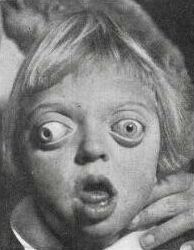Craniosynostosis
(Redirected from Kleeblattschädel)
Editor-In-Chief: Prab R Tumpati, MD
Obesity, Sleep & Internal medicine
Founder, WikiMD Wellnesspedia &
W8MD medical weight loss NYC and sleep center NYC
| Craniosynostosis | |
|---|---|

| |
| Synonyms | N/A |
| Pronounce | N/A |
| Specialty | N/A |
| Symptoms | Abnormal head shape, developmental delay |
| Complications | Increased intracranial pressure, visual impairment, hearing loss |
| Onset | Infancy |
| Duration | Lifelong |
| Types | N/A |
| Causes | Genetic mutations, environmental factors |
| Risks | Family history, advanced paternal age |
| Diagnosis | Physical examination, imaging studies |
| Differential diagnosis | Positional plagiocephaly, hydrocephalus |
| Prevention | None |
| Treatment | Surgery, helmet therapy |
| Medication | N/A |
| Prognosis | Generally good with treatment |
| Frequency | 1 in 2,000 to 2,500 live births |
| Deaths | N/A |
A condition in which one or more of the fibrous sutures in an infant skull prematurely fuses.
Craniosynostosis is a birth defect in which the bones in a baby’s skull join together too early. This happens before the baby’s brain is fully formed. As the baby’s brain grows, the skull can become more misshapen. The spaces between a typical baby’s skull bones are filled with flexible material and called sutures. These sutures allow the skull to grow as the baby’s brain grows. When one or more of the sutures closes too early, it changes the growth pattern of the skull.
Types[edit | edit source]
Craniosynostosis can affect one or more of the sutures in a baby’s skull. The types of craniosynostosis are named according to the sutures involved.
Sagittal synostosis[edit | edit source]
The most common type of craniosynostosis is sagittal synostosis. It affects the suture that runs from front to back at the top of the skull. This causes the head to grow long and narrow, a condition known as scaphocephaly.
Coronal synostosis[edit | edit source]
Coronal synostosis affects one or both of the sutures that run from ear to the top of the skull. If one suture is affected, it is called unilateral coronal synostosis, leading to plagiocephaly. If both sutures are affected, it is called bilateral coronal synostosis, leading to brachycephaly.
Metopic synostosis[edit | edit source]
Metopic synostosis affects the suture that runs from the top of the head down the middle of the forehead, toward the nose. This can cause a triangular-shaped forehead, known as trigonocephaly.
Lambdoid synostosis[edit | edit source]
Lambdoid synostosis is the rarest form and affects the suture at the back of the head. It can cause the head to flatten on one side, leading to posterior plagiocephaly.
Causes[edit | edit source]
The exact cause of craniosynostosis is not known. It can occur as an isolated condition or as part of a syndrome. Genetic factors may play a role, and certain mutations have been associated with syndromic craniosynostosis.
Syndromic craniosynostosis[edit | edit source]
Craniosynostosis can be part of a genetic syndrome. Some of the syndromes associated with craniosynostosis include:
Crouzon syndrome[edit | edit source]
Crouzon syndrome is characterized by the premature fusion of certain skull bones, leading to abnormal head shape, facial anomalies, and sometimes exophthalmos.
Apert syndrome[edit | edit source]
Apert syndrome involves craniosynostosis, syndactyly (fusion of fingers and toes), and other skeletal abnormalities.
Carpenter syndrome[edit | edit source]
Carpenter syndrome is a rare condition that includes craniosynostosis, obesity, and other skeletal abnormalities.
Diagnosis[edit | edit source]
Diagnosis of craniosynostosis is typically made through physical examination and imaging studies such as X-ray or CT scan. These imaging techniques can help determine which sutures are affected and the extent of the condition.
Treatment[edit | edit source]
Treatment often involves surgery to correct the shape of the skull and allow for normal brain growth. The timing and type of surgery depend on the severity of the condition and the sutures involved.
Prognosis[edit | edit source]
With early diagnosis and treatment, most children with craniosynostosis can have normal cognitive development and a good quality of life. However, untreated craniosynostosis can lead to increased intracranial pressure and developmental delays.
See also[edit | edit source]
Search WikiMD
Ad.Tired of being Overweight? Try W8MD's physician weight loss program.
Semaglutide (Ozempic / Wegovy and Tirzepatide (Mounjaro / Zepbound) available.
Advertise on WikiMD
|
WikiMD's Wellness Encyclopedia |
| Let Food Be Thy Medicine Medicine Thy Food - Hippocrates |
Translate this page: - East Asian
中文,
日本,
한국어,
South Asian
हिन्दी,
தமிழ்,
తెలుగు,
Urdu,
ಕನ್ನಡ,
Southeast Asian
Indonesian,
Vietnamese,
Thai,
မြန်မာဘာသာ,
বাংলা
European
español,
Deutsch,
français,
Greek,
português do Brasil,
polski,
română,
русский,
Nederlands,
norsk,
svenska,
suomi,
Italian
Middle Eastern & African
عربى,
Turkish,
Persian,
Hebrew,
Afrikaans,
isiZulu,
Kiswahili,
Other
Bulgarian,
Hungarian,
Czech,
Swedish,
മലയാളം,
मराठी,
ਪੰਜਾਬੀ,
ગુજરાતી,
Portuguese,
Ukrainian
Medical Disclaimer: WikiMD is not a substitute for professional medical advice. The information on WikiMD is provided as an information resource only, may be incorrect, outdated or misleading, and is not to be used or relied on for any diagnostic or treatment purposes. Please consult your health care provider before making any healthcare decisions or for guidance about a specific medical condition. WikiMD expressly disclaims responsibility, and shall have no liability, for any damages, loss, injury, or liability whatsoever suffered as a result of your reliance on the information contained in this site. By visiting this site you agree to the foregoing terms and conditions, which may from time to time be changed or supplemented by WikiMD. If you do not agree to the foregoing terms and conditions, you should not enter or use this site. See full disclaimer.
Credits:Most images are courtesy of Wikimedia commons, and templates, categories Wikipedia, licensed under CC BY SA or similar.
Contributors: Kondreddy Naveen, Prab R. Tumpati, MD





